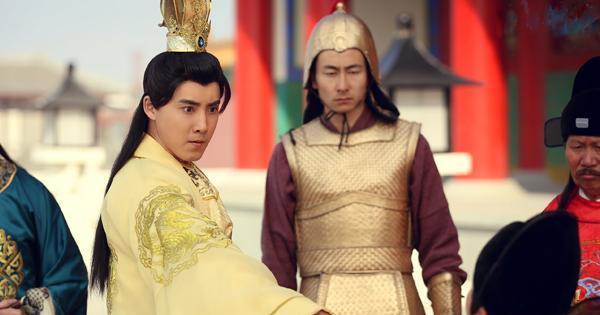The Jianwen Emperor Zhu Yunjiao was deeply influenced by Confucian culture since childhood, and like his father Zhu Biao, he was gentle and elegant, tolerant, and even too benevolent. For example, during the "Battle of Jingnan", the army of the imperial court could actually kill Zhu Di, but Emperor Jianwen issued an edict "Do not let Shuo have the name of killing uncle", which resulted in the front-line soldiers tying their hands and feet.
For example, Li Jinglong led an army of 600,000 people to many fiascos, which made the imperial court soldiers stretched thin, but Emperor Jianwen did not punish him, but continued to appoint him to guard the gates of Nanjing. As a result, Li Jinglong secretly surrendered, opened the Jinchuan Gate, and welcomed Zhu Di into the city, causing Nanjing to fall without a fight. However, just before he disappeared, Emperor Jianwen, who had always been benevolent, suddenly became fierce and actually killed people with his own hands.

This figure who was killed by Emperor Jianwen was not trivial, his name was Xu Zengshou, and he was the son of Xu Da, the founding hero of the Ming Dynasty. Xu Da had four sons and four daughters, the eldest daughter was Zhu Di's wife, the eldest son was named Xu Huizu, who inherited his father's title, and Xu Zengshou ranked third. When he was young, he followed his father Xu Da into the palace, and Zhu Yuanzhang gave him the name "Increased Life", but he did not live long.
Xu Zengshou was born as a shogun and also liked to fight and kill, so he always held a military position, and the official was the governor of Zuodu. In the last year of Hongwu, Zhu Yuanzhang ordered Zhu Di to march north to Nai'er, and Xu Zengshou also participated in this military operation with his brother-in-law. Zhu Di had been accumulating strength before the rebellion. Emperor Jianwen summoned Xu Zengshou to inquire, and Xu Zengshou knelt down and said, "Emperor Yan was in the same breath, and the wealth was extreme, so why did he oppose!" ”
That being said, in fact, Xu Zengshou was already familiar with Zhu Di's plan, and had been secretly transmitting the situation of the imperial court to Zhu Di, "and Yan Shiqi, the number of Jingshi false losses to Yan." It can even be said that Xu Zengshou was Zhu Di's "spy" in the imperial court, and he made a great contribution to the victory of the "Battle of Jingnan", "the act of righteousness of the superior, the most effective and diligent in increasing life".
Xu Zengshou's eldest brother, Xu Huizu, was completely different from his younger brother, and he was loyal to Emperor Jianwen. Before Zhu Di rebelled, his son Zhu Gaoxu was still in Nanjing, stealing Xu Huizu's good horse and escaping. Xu Huizu immediately realized that the situation was not good, and while sending people to pursue, he played Emperor Jianwen on the other. Therefore, although Xu Huizu was also Zhu Di's brother-in-law, Emperor Jianwen trusted him.
In the course of the Battle of Jingnan, Xu Huizu was once ordered to lead an army north, "defeating the Yan soldiers at Mount Qimei, and the Yan people were afraid." After the Yan army crossed the river, Xu Huizu "led the army to fight", and after Zhu Di entered the city, he "guarded his father's ancestral shrine alone". Xu Huizu refused to recognize Zhu Di's throne, and when the authorities interrogated him, they "only wrote his father The Founding Medal and the death-free words in the coupons." Zhu Di was very angry, but he did not kill Xu Huizu and imprisoned him to death.
Speaking of Xu Zengshou, he was different, and had been secretly assisting Zhu Di and leaking imperial secrets. When he saw the Yan army enter the city of Nanjing, Emperor Jianwen realized that Xu Zengshou was an "internal traitor", and the emperor, who had always been benevolent, could no longer contain his anger, and he summoned Xu Zengshou to the palace, "Question, no." The weak Jianwen Emperor personally swung his sword and killed Xu Zengshou under the right Shunmen.
After that, Emperor Jianwen disappeared. Zhu Di successfully entered the palace, found Xu Zengshou's body, wept bitterly on the spot, and ordered someone to bury it near Xu Da's tomb. After Zhu Di ascended the throne, he was given the title of Jing Nan Meritorious Servant, and he did not forget Xu Zengshou, "Marquis of Wuyang, Yu Zhongxuan", and it was not long before he "sealed the Duke of Dingguo, Lu 2,500 stones, and his son Jing Changsi".
That is to say, although Xu Zengshou did not wait for the day when Zhu Di "won", he was also included in the ranks of the Heroes of the Jing Dynasty, and he was of a very high rank, and he was a hereditary duke. After Xu Huizu's death, his son was also restored to the title of Duke of Wei. Since then, the Xu Da family has two hereditary titles, one is the Duke of Wei who lives in Nanjing, and the other is the Duke of Dingguo who lives in Beijing, which can be called the most prominent family of the Ming Dynasty until the fall of the Ming Dynasty.
References: 1. "History of Ming"; 2. "Records of Emperor Taizong of Ming"; 3. "Records of the Sacrifice of the State Dynasty"